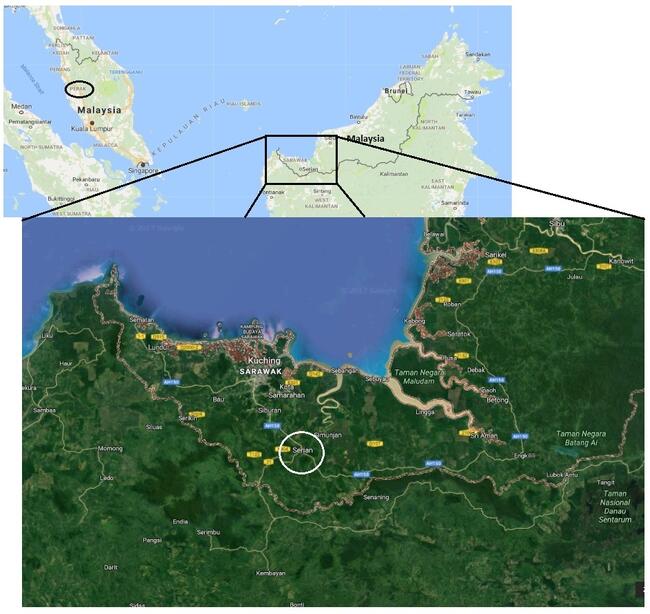Rabies without borders
- Community News
- Cases and responses
On the 17th of July, a 5 year old girl died of rabies in the Sarawak General Hospital in Kuching, the capital of Sarawak in Malaysia. This little girl became the fourth child victim of rabies from this small area this month, all of them bitten by dogs around the town of Serian, near to the Sarawak border with Indonesia (see map). The first victims, a 6 year old girl and her 4 year old brother died on July 4th. A third case, a child of 7 years old was under intensive care observation, but died on July 13th. These are the first human rabies deaths in Malaysia in 20 years and naturally are of great concern.
Other children bitten and initially suspected of having contracted rabies have tested negative, but on July 18th a 52 year old man was confirmed as having contracted rabies following a dog bite in early May.
The rabies virus is suspected as having crossed into Sarawak from the Kalimantan region of Indonesia. A notification of a total of 32 rabies cases in dogs and cats from two villages near Serian was sent to the OIE dated July 10th, and this was updated with a total of 23 more cases from 9 more villages in a report dated July 18th. Most concerning in this second report is one rabid dog reported in Taiping, Perak, in peninsular Malaysia, but it is not clear how the outbreaks are connected. Further reports will be submitted on an ongoing basis.
Since 1954, Malaysia has been one of a small number of rabies-free areas in Asia, but incursions across its borders have been an ongoing battle. A dog rabies outbreak that crossed into the far northern states of Malaysia from Thailand removed the country’s rabies-free status in 2015. This previous outbreak was detected in dogs and brought under control without any human cases occurring. The current situation would appear to be more serious, as it looks now like rabies could have been circulating in dogs in Southern Sarawak for some months. This outbreak will need to be curtailed in dogs and no cases in dogs confirmed, and will delay Malaysia being able to claim that it is Rabies-free once again.
As of the news report on July 18th, seven villages had been declared rabies infected areas and the Sarawak Veterinary Services Department had vaccinated 7,655 pets, including 2,205 dogs, 5,424 cats and 26 other animals, and 73 stray dogs have been captured. Rabies awareness campaigns are urging people to get their pets vaccinated and seek treatment for dog bites, and 250 people have received Post Exposure Prophylaxis to prevent the symptoms of rabies. The OIE notification details more stringent animal movement controls, further vaccination efforts and surveillance outside these affected zones that will be increased.
These situations are similar to an incursion into the Arequipa region of Peru from Bolivia which occurred in 2015, and the introduction of rabies onto the historically rabies-free Indonesian islands of Flores in 1997 and Bali in 2008. Recent genetic analysis suggests that Flores and Bali were also infected following the introduction of rabid dogs from the Kalimantan region of Indonesia, and several other inter-island introductions via dogs transported on fishing boats have also been proposed.
Such incursions into previously rabies free areas are a continuing threat to rabies-free areas whilst ever any country in a region harbours ongoing rabies transmission. Land borders between countries may be very rural, remote from the capital, and sometimes disputed territory, making rabies control programmes especially difficult to enact. Much of the interior of Sarawak is rugged, dense rainforest for example. Such areas may have very low levels of routine vaccination and surveillance activities. Although islands have the advantage of their naturally impenetrable borders, it is clear that human-mediated transportation of rabid animals is a big risk where fishing or other boats frequently travel across them.
These cross-border threats undermine efforts of individual countries to gain and to maintain rabies freedom, a fact that underscores the need for regional cooperation. Regional networks can support coordinated rabies control efforts across whole regions, and highlight countries in need of extra assistance for building the capacity to reduce the burden of rabies, As travel increases exponentially, support for rabies control in all countries is of global benefit.
Written by Louise Taylor of GARC, based on news reports in The Star Online, the MalayMail Online, and the notifications to the OIE and published articles referenced by the links.
